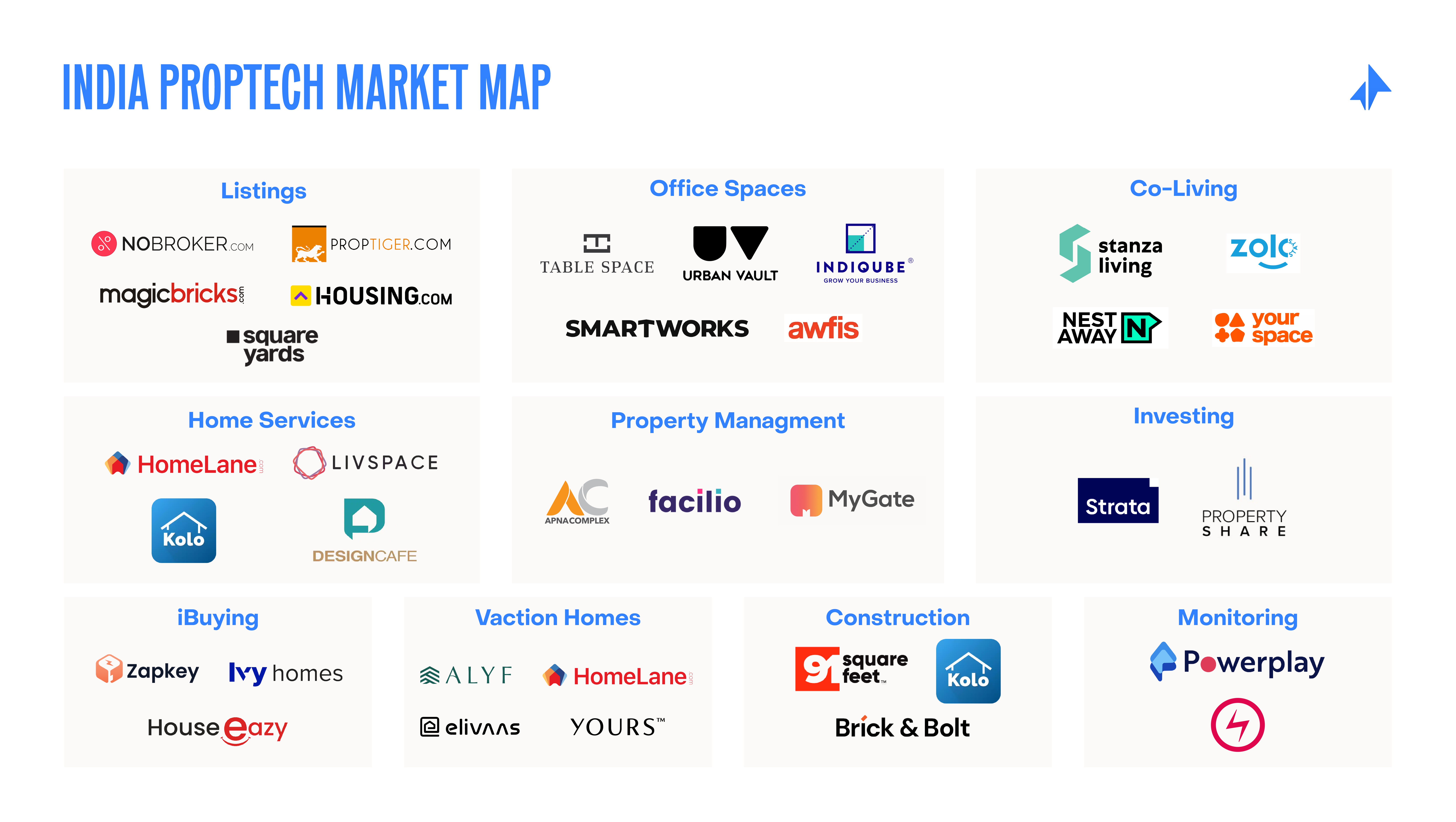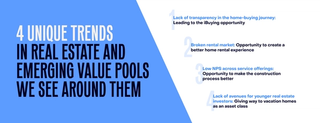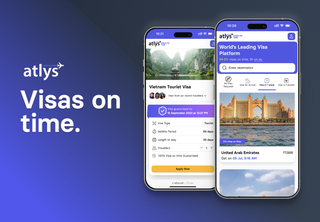Unlocking Value In PropTech: Emerging Trends That Will Shape The Indian Landscape
4 emerging trends & themes to help guide founders
Unlocking Value In PropTech: Emerging Trends That Will Shape The Indian Landscape
4 emerging trends & themes to help guide founders
Real estate is a unique asset class - one of the oldest and largest, one which reflects economic health, and one that has buyer emotions deeply tied into it. We’ve now been through multiple cycles of innovation within the segment since the early days of classifieds, and we’ve seen how the industry has slowly evolved towards better symmetry of information and buying experience.
There have been structural changes over time from multiple directions.
With the emergence of a whole new class of the first-time wealthy (AKA new money) as India marches to become an upper-middle-income economy, investing in real estate is becoming a large opportunity where innovative models are coming up to attract these value pools.
The introduction of the RERA Act has strengthened regulation and buyer safety, enabling more transparency in the process of home buying. This has meant developers need to better their tooling to track and document the construction process.
There has been support in the form of lower interest rates in recent years that has pushed for more investments within real estate (although rates are now inching upwards). The pandemic also re-induced the desire to own a home (and maybe a second home) across a large set of people.
At Elevation Capital, we’ve been a part of the incredible journeys of defining PropTech companies like PropTiger, NoBroker, and Strata which each represent different stages and sub-markets where innovations within real estate have occurred over the last decade.
Below, we outline the current spread of teams already building actively amongst some legacy spaces as well as some of the newer opportunities that have opened up:
.png?rect=10,0,9430,5334&w=320&h=181&auto=format)
As a team, we continue to feel displeased by the depth of pain points that still plague the industry and feel excited about the opportunities that are building up.
The market, however, does not reflect this opportunity. While real estate makes up 7% of India’s GDP, in recent years, the number of startups in the PropTech space has been a mere ~1-2% of overall startups created.
Keeping this in mind, we are laying out what we are seeing as emerging trends and themes in the space to help guide entrepreneurs who are building within it.
Unique Trends Within The Indian Real Estate Market, And Emerging Value Pools We See Around Them

As we looked at several of these spaces and observed global plays emerge across them, there is much that makes the Indian PropTech problem set unique.
Certain multi-decade attributes shape how the market behaves. Below we cover four of the major problem areas and trends, and emerging themes that build around the same:
1. Lack of transparency in the home-buying journey, leading to the iBuying opportunity
The process of home buying continues to be plagued by information asymmetry. In primary home purchases, information asymmetry exists while in secondary home purchases, brokers often elongate the process due to a lack of incentives to turn around sales quickly. This leads to a loss of value within the market for buying and selling of homes.
Direct property buying models have now attracted heavy capital across global markets, but we are yet to see a large outcome in India - the space is very much up for grabs. Global parallels include Opendoor (US), Casavo (Italy), Loft (Brazil). Given the lack of transparency in buying/selling secondary homes, we feel an organized player can manage this process end to end, using upfront capital as a way to unlock a unique supply of homes, and then delivering value through a clean, trustworthy home discovery and buying experience.
There are already early signs of teams building within the space, and local versions of this model already exist in the form of ATS (agreement to sell) contracts. Overall, this follows trends of moving from listings-based marketplaces to ownership-led models that we have already seen in other assets (such as cars), but the pain points and opportunities within real estate are deeper, with a lot of value left to be captured.
2. Broken rental market, with an opportunity to create a better home rental experience
Rental yields in India have hovered around the 2-3% range for the longest time, making the proposition of buying a home to rent out financially unattractive. India lies in the bottom 10% of the top 100 countries when comparing rental yields against mortgage rates. Right from the quality of new inventory available for rentals to middlemen and processes involved in the rental process, much remains broken and lacks incentives to bring solutions.
People have barely tried to solve for home rentals, for reasons mentioned earlier - low rental yields mean that there is little value to extract through these transactions. This is a driving reason behind everything about the rental process being painful: lack of visibility on all supply in the market, lack of trust between landlords and tenants, and potential for disputes that lead to a lot of landlords being discouraged from ever listing.
We feel there is an opportunity for an organized player to take over everything that is broken about the process: manage the process of showing homes, manage all communications between landlords and tenants, and standardize the rental contracts and payments process to give more comfort and assurance to both parties. The value unlocks here can come from expanding the market and bringing in previously unavailable homes, charging a service fee for the same. Companies like QuintoAndar in Brazil have shown the depth in this model.
3. Low NPS across service offerings, with the opportunity to make the construction process better
From new home construction to interior designing to maintenance services - all categories involving local area contractors have traditionally been painful - with cases of customers getting wrongly charged, timelines getting stretched, and final quality of work being below expectations. Startups such as Livspace and HomeLane have already started to improve the home interiors segment and show how organized players can help here.
As builders look to modernize their processes, tools and software that help with multiple facets of the construction processes like project management, workforce management, materials purchase etc., can make this transition easy. Today, a lot of this happens over traditional tools such as Excel & WhatsApp, but given these aren’t attuned to industry specifics, they’re not the most efficient.
However, software alone will not be the answer to this problem. We believe that there is an opportunity for a tech-enabled platform to emerge that helps manage the end-to-end construction site activities by providing real-time transparency and professional oversight to ensure timely execution of projects.
4. Lack of avenues for younger real estate investors, giving way to vacation homes as an asset class
While not so much a key problem of the industry, this is more of a trend that entrepreneurs can capitalize upon. As the number of wealthy individuals increases in India, while startups amongst other classes (stocks, gold, crypto etc.) have guided on how to invest this capital, this trend is still early within real estate.
Vacation homes/second homes have emerged as an asset class of choice recently and made themselves even more relevant through Covid - as people found having a second home in destinations like Goa and Dehradun can be very rewarding.
Interestingly, this is not just a means to park excess capital, but actually can turn out to be a sound financial investment. While residential rental yields in major cities are as low as 2-3%, the rental yield of a home on the outskirts of Mumbai or in Goa has been as high as 10-12%+. We are increasingly seeing companies such as Vacasa, Pacaso, Sonder being built in this space globally.
We’re seeing three broad models emerge in the space that try to capture value:
- Property Management: Organized service organizations are in the early phase of getting built, that help existing second home owners with the upkeep of their property as well as helping with ROI by listing them across OTAs/Airbnb and managing guest experiences.
- Fractional Ownership: Given second homes may still be a difficult investment for bulk of the income groups, fractional ownership models are emerging that help buyers invest a smaller capital for partial ownership of the asset - enabling them to use it for personal use for a certain number of days
- Enabling Investments: The third model plays on investors that are looking at second homes for pure financial returns owing to higher rental yields and eventual capital appreciation. Here, against fractional/whole investment within the vacation home, such enablers help with property management and assurance of the performance of the asset by listing it and realizing its commercial value.
Summary
While we’ve listed out some of the themes that have caught our attention through this article, we believe the opportunity is wider than that, and are excited to see newer approaches to solve some of the critical pain points.
As a team, it is always surprising to see capital not following areas with large dollar potential and one that is ridden with poor NPS. The above piece is our attempt to sketch out themes and trends we’ve spotted, actively meeting and deep-diving within a sector that feels slower in recent years. We call on more builders to reach out to us and share their thoughts and ideas.
If you are building within the space/have feedback for us - do reach out to anand@elevationcapital.com and manish@elevationcapital.com
Written by Manish Advani
Related

Harnessing Better Experience And Innovative GTM: Marketplaces Unleashed Part 3
Exploring the last two pillars of our marketplaces framework through case studies
03.08.2023

Vridhi: Reimagining Home Lending For Bharat's Self-Employed
Ram Naresh Sunku, Co-founder, Vridhi Home Finance
11.12.2024

Investing in Atlys
Building the world’s largest digital visa provider
21.09.2023